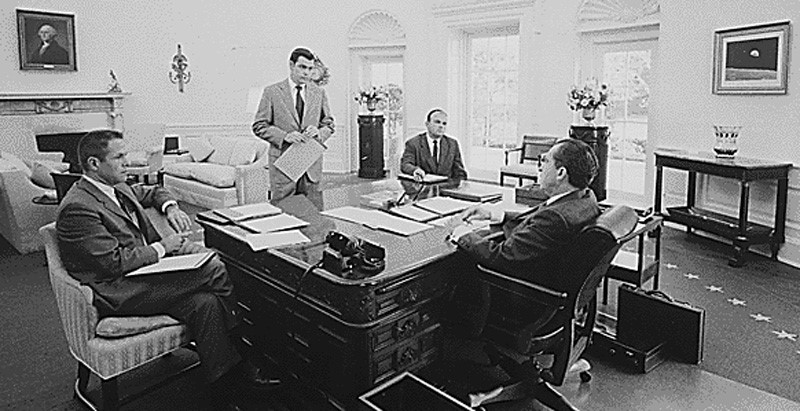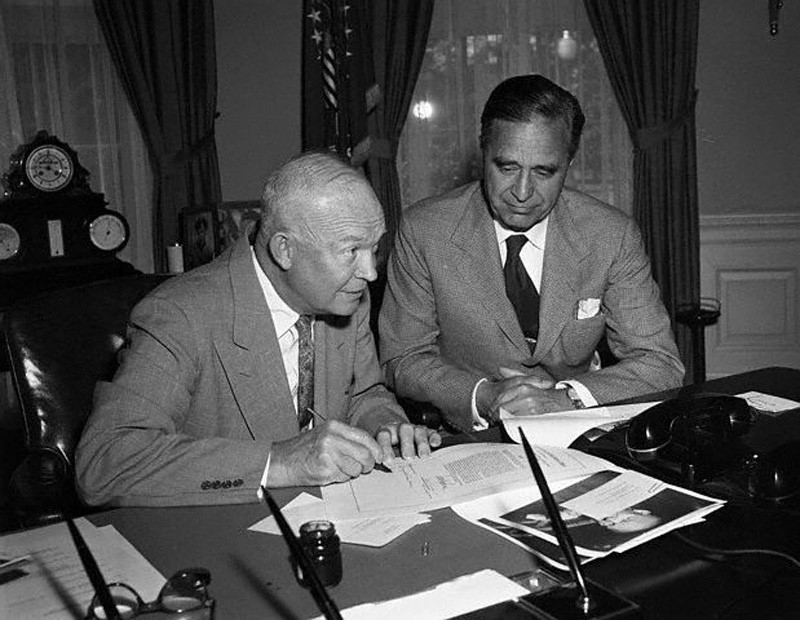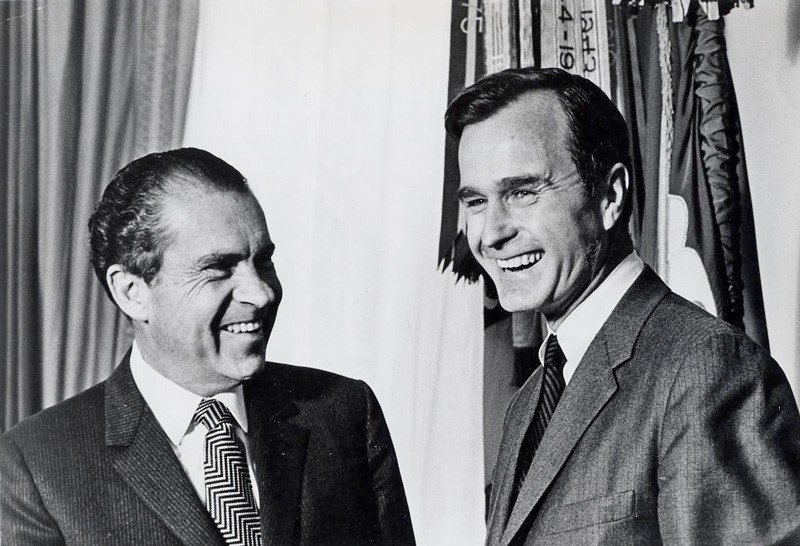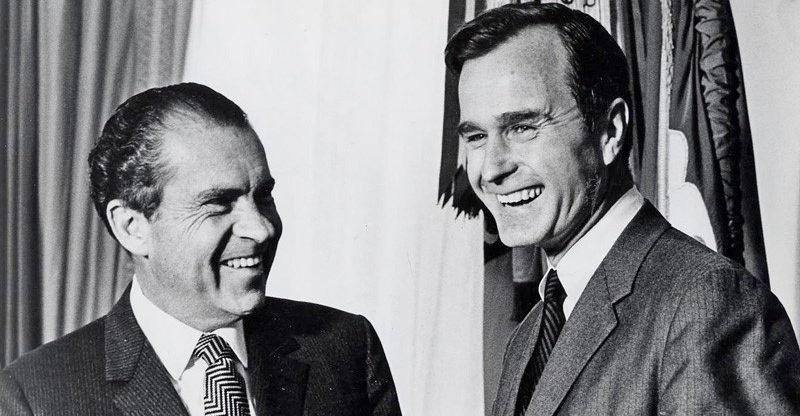Allegations regarding “Butch” Merritt, Watergate, Intelligence Agencies and “Crimson Rose,” Vol. III
Agnostics for Nixon, Part Two
Written (and first posted) by Kris Millegan, March 17, 2011
…”the President believes that it is going to open the whole Bay of Pigs thing up again. And, ah, because these people are plugging for, for keeps and that they should call the FBI in and say that we wish for the country, don’t go any further into this case,” period! President Nixon, White House Tapes, June 23, 1972
The evidence for Nixon being, by trade, a blackmailer is not very hard to find. It seemed second nature to him. Blackmail, as shown in the above transcript, was a way to solve things.
The use of blackmail as a tactic, was so much of his personality that it appeared to be mirrored back to him in his loyal aides:
HR “Bob Haldeman: You may just blackmail [former President Lyndon] Johnson on this stuff
President Nixon: What?
Haldeman: You can blackmail Johnson on this stuff, and it might be worth doing.
President Nixon: How?
Haldeman: The bombing-halt stuff is all in the same file. Or in some of the same hands.
—
Haldeman: We have a basic history of it constructed our own, but the—there is a file on it.
President Nixon: Where?
Haldeman: [White House Aide Tom Charles] Huston swears to God there’s a file on it at [the] Brookings [Institution].
Kissinger: I wouldn’t be surprised.
President Nixon: All right, all right, all right. Do you remember—
Haldeman: In the hands of the same kind—
President Nixon: Bob—
Haldeman: —the same people.
President Nixon: Bob, now you remember Huston’s plan? Implement it.
Kissinger: But couldn’t we go over—now, Brookings has no right to have classified documents.
President Nixon: [Unclear—overlapping voices.] You know, I mean, I want it implemented on a thievery basis. Goddamn it, get in and get those files. Blow the safe and get it.
Haldeman: They may very well have cleaned them by now, with this thing getting to—
Kissinger: Well, I wouldn’t be surprised if Brookings had the files.
Haldeman: Well, my point is, Johnson knows that those files are around. He doesn’t know for sure that we don’t have them.
Kissinger: But what good will it do you, the bombing-halt file?
Haldeman: The bombing halt—
President Nixon: To blackmail him—
Haldeman: —the bombing halt—
President Nixon: —because he used the bombing halt for political purposes.
Oval Office conversation, June 17, 1971

President Nixon meets with chief advisers in the Oval Office, 03/13/1970
Nixon had no problem blackmailing a former President of the United States.
So what is blackmail?
According to Wiki:
“Blackmail is the act of threatening to reveal substantially true information about a person to the public, a family member, or associates unless a demand is met. This information is usually of an embarrassing, socially damaging, and/or incriminating nature. As the information is substantially true, the act of revealing the information may not be criminal in its own right nor amount to a civil law defamation; it is the making of demands in exchange for withholding the information that is often considered a crime. English Law creates a much broader definition of blackmail, covering any unwarranted demands with menaces, whether involving revealing information or not. However, from a libertarian perspective, blackmail is not always considered a crime. Some libertarians point out that it is licit to gossip about someone else’s secret, to threaten to publicly reveal such information, and to ask that person for money, but it is illegal to combine the threat with the request for money, which raises the question, “Why do two rights make a wrong?”
“Blackmail is a form of extortion, in which a threat is made to disclose a crime or social disgrace. Extortion is the taking of personal property by threat of future harm.
“18 U.S.C. § 873 states, “Whoever, under a threat of informing, or as a consideration for not informing, against any violation of any law of the United States, demands or receives any money or other valuable thing, shall be fined under this title or imprisoned not more than one year, or both.”
From http://koehlerlaw.net/assault-theft/extortionblackmail/:
“There are two elements to the criminal offense of extortion in Washington, D.C. First, the person needs to obtain or seek to obtain the property of another with the person’s consent. Second, the other person’s consent needs to have been coerced through “actual or threatened violence or by wrongful threat of economic injury.”
“Blackmail also has two elements. The first relates to criminal intent. That is, the person needs to intend to obtain property from someone else or to cause the other person to do or refrain from doing something. Second, in order to achieve the intended goal, the person needs to threaten either: (1) to accuse the other person of a crime, (2) to expose a secret or asserted fact that could subject the other person to “hatred, contempt, or ridicule,” or (3) to damage the other person’s reputation.
“The maximum penalty for a conviction for extortion is a $10,000 fine and/or imprisonment for 10 years. The maximum penalty for blackmail is a $1000 fine and/or imprisonment for not more than 5 years. D.C. Criminal Code 22-3251; D.C. Criminal Code 22-3252.
Well, there are those that say the President is above the law.
Just for a sidebar giggle look at the below, kind of ironic:
Accession
Number : AD0672250
Title : THE THEORY AND PRACTICE OF BLACKMAIL
Corporate Author : RAND CORP SANTA MONICA CA
Personal Author(s) : Ellsberg, Daniel
Handle / proxy Url : http://handle.dtic.mil/100.2/AD672250
Report Date : JUL 1968
Pagination or Media Count : 41
Abstract : An examination of the anatomy of blackmail, policy, risks,
deterrence, the scope, the art of.
Descriptors : *APPLIED PSYCHOLOGY, DECISION MAKING, LIFE
EXPECTANCY(SERVICE LIFE), PREDICTIONS, STRENGTH(PHYSIOLOGY), GAME THEORY,
PROPAGANDA, MONEY, SELECTION, PROBABILITY, MATHEMATICAL LOGIC, THREAT
EVALUATION
Subject Categories : PSYCHOLOGY
Distribution Statement : APPROVED FOR PUBLIC RELEASE
Aha, it’s not a crime, it’s a strategy. Strategy trumps ethics it appears.
OK, so what, President Nixon was a blackmailer. He was a bad man and went bye-bye. Yippee!
Well, not quite, you see in blackmail, you have at least two sides, the blackmailer and the person or persons getting blackmailed, and sometimes even more sides. First the blackmail itself may have a side, especially if the blackmail is a person, instead of some tape or other incriminating evidence, and then there may be others that discover the blackmail and hijack the operation for their own ends.
The blackmailed person, what do they do? Do they simply submit and give the blackmailer whatever they want? Forever?
Or could a blackmailed person figure out how to use the situation to their best advantage. Because once a person blackmails someone, they are now involved in a symbiotic relationship beyond, “scratch my back and I’ll scratch yours.” Their secrets become your secrets, their future becomes your future, their friends become your “friends.” If the blackmailer uses his dirt, he kills the goose that lays his golden eggs.

Ike and his best golfing buddy, Prescott Bush
How did Nixon’s star rise so fast? Elected to the US House and six years later vice-president of the United States. I don’t think it was his LA mob friends that got him all the press and juicy gigs. Speaking of juice, Nixon sure kept giving out plums to George Herbert Walker Bush, Prescott’s boy. After losing a US senate race, George was appointed to serve as the US Ambassador to the UN, then, chairman of the Republican National Committee, and the very first envoy to China. I am sure the jobs came because of Bush’s vast experience.
Bush was considered for the position of Vice-President under Gerald Ford, eventually accepting to serve as the Director of Central Intelligence, another job Bush received even though his résumé for the position was rather thin.
Back to blackmail and Watergate, there was an interesting squiggle before the Watergate Scandal took down President Nixon, The Townhouse Affair, where a White House Staffer working out of a basement took in money, put it in the bank, converted it to cashier checks and distributed it to Republican faithful.
The strangest part was when higher-ups had that staffer, Jack Gleason, flying around the country giving an extra $6,000 in cash-stuffed envelopes directly to candidates, with the message, “From Dick and Pat.”
Gleason testified in 1973 to the Watergate Special Prosecutor: “The purpose of these contributions was to set up possible blackmail for these candidates later on.”
Russ Baker in Family Secrets (highly recommended) looked into the Townhouse affair deeply and came away with a thesis, with evidence backing it up, that the Townhouse affair hadn’t been directed by Nixon and was used to embroil him in a scandal, that wasn’t sexy enough to garner attention, but the next act, Watergate, hit a home run and Nixon was gone.
Russ Baker, author of Family Secrets states: “I found that the very people who created Nixon and used him to advance their own political interests ended up destroying him.”
But why get rid of Nixon then, why risk the exposure? What was going on?
Watergate was all about endgame, but the warm-up activities were intriguing. And the game itself wasn’t exactly an organic event. Watergate was psy-op.
As John Kennedy said, “Things do not happen. Things are made to happen.”
Kris Millegan, March 17, 2011

to be continued …
Watergate Exposed: How the President of the United States and the Watergate Burglars Were Set Up (as told to Douglas Caddy, original attorney for the Watergate Seven), by Robert Merritt, is available at TrineDay, Amazon, Barnes & Noble, The Book Depository, and Books-a-Million.









